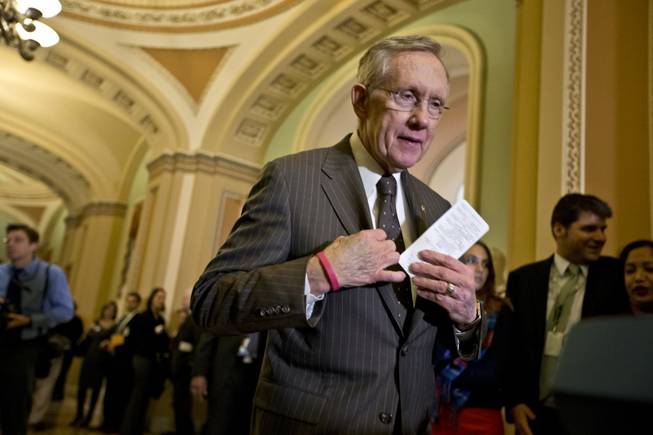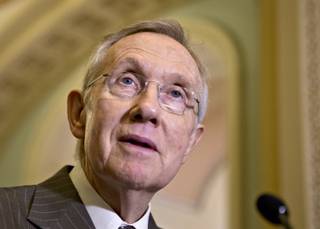
J. Scott Applewhite / AP
Senate Majority Leader Harry Reid of Nevada arrives to speak with reporters on Capitol Hill in Washington, D.C., after a Democratic strategy session on Tuesday, Dec. 11, 2012.
Published Thursday, Dec. 13, 2012 | 10:47 a.m.
Updated Thursday, Dec. 13, 2012 | 11:42 a.m.
Sen. Harry Reid is still very much locked in a standoff with House Speaker John Boehner over how to avoid going over the fiscal cliff.
But little by little, Reid feels like he’s gaining ground.
“With every passing day the Republicans are calling on Speaker Boehner to guarantee tax cuts for the middle class,” he said Thursday.
Reid counts his latest conquest in Sen. John Cornyn of Texas, set to be the Republicans’ second-highest ranking Republican next year after Sen. Jon Kyl of Arizona retires.
Cornyn said this week that he believes that Congress will have to pass the Democrats’ proffer, a bill to extend lowered tax rates for income levels up to $250,000 only, “sooner or later,” since the end-of-year deadline didn’t leave them much choice: After December 31, those tax rates will rise, along with those for the wealthier tax brackets, anyway.
“More than three-quarters of the American people, including 61 percent of Republicans, agree with John Cornyn that the middle class shouldn’t be held hostage to move giveaways for millionaires,” Reid said.
Senate Republicans may not all share Cornyn’s view about the inevitability of supporting the Democrats’ bill, but there is a noticeably more favorable atmosphere around it than there was before the election. Sen. Bob Corker of Tennessee said earlier this month he thought simply adopting it and then arguing about cuts to entitlements -- the trade-off Republicans have favored -- later would be the “best route” forward. Sen. Dean Heller has said repeatedly that he isn’t opposed to the idea -- though he does not support it.
But while Reid may find such thawing sentiments encouraging, it doesn't necessarily translate to the votes he needs to get the Democrats’ bill through Congress. The Senate already passed the bill in September; what he really needs now is the cooperation of the House.
So far, that isn’t coming.
On Thursday, Boehner reiterated his insistence that a deal to avoid the fiscal cliff focus on cutting spending, not fiddling with tax rates.
“It’s clear the president’s just not serious about cutting spending...it appears he’s willing to slow-walk any agreement and walk our economy right up to the fiscal cliff,” Boehner said. “Washington has a spending problem that can’t be fixed with tax increases alone.”
Boehner warned House Republicans earlier this week not to make many plans before or after Christmas, in apparent anticipation that working out this deal could take a long time.
Reid contends, however, that it’s Republicans who haven’t been willing to budge on making a deal.
“To this day Republicans have not identified five cents in actual money,” Reid said. “They speak in generalities.
“Entitlements? We looked at that. The Affordable Care Act? We looked at that...we know we’ll have to do some [cuts], we’ll be glad to do that and it’s part of what we need to do,” Reid said. “If we had some movement on those rates, the president has said he’s willing to take some significant action.”
But Republicans have another complaint. Even if Reid and the Senate Democrats, aided by the ticking clock, are able to get their bill on tax rates through, it doesn’t address every spiking tax rate problem.
The terms of the estate tax and other provisions of the non-income tax code will also be expiring at the end of the year, creating other potential sources of a rising tax burden on families.
Reid said he would not move a separate bill to extend those other expiring tax provisions unless Republicans and Democrats could first strike a larger deal to avert the fiscal cliff.
That raises the stakes over expiring tax rates even higher and suggests that if Reid and Boehner can’t shake hands on extending tax cuts for the middle class and letting tax rates on the wealthiest income brackets rise, doctors will see their Medicare premiums fall, families with dying relatives will see much of their inheritance — anything over $1 million — taxed away and Nevadans will not be able to claim sales tax deductions on their 2012 returns.
“That’s something we should negotiate,” Reid said Thursday. But again, he turned his focus to the Republicans. “It’s all in their hands.”


Join the Discussion:
Check this out for a full explanation of our conversion to the LiveFyre commenting system and instructions on how to sign up for an account.
Full comments policy